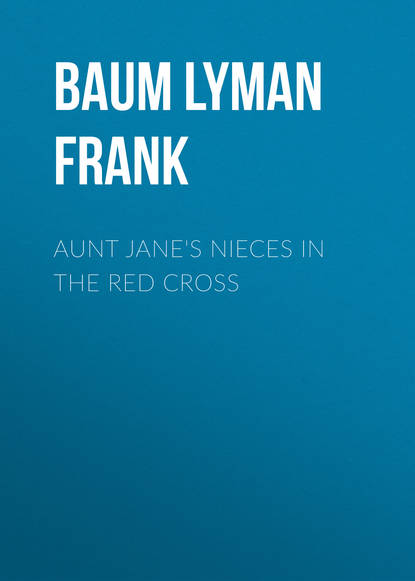По всем вопросам обращайтесь на: info@litportal.ru
(©) 2003-2025.
✖
Aunt Jane's Nieces in the Red Cross
Настройки чтения
Размер шрифта
Высота строк
Поля
"Perhaps we ought to proceed directly to Ostend," said Uncle John.
"The Germans still hold it, monsieur. In a few days, perhaps, when Belgium is free of the invaders, you will find work enough to occupy you at Ostend; but I advise you not to attempt to go there now."
In spite of the friendly attitude of this officer and of the authorities at Cherbourg, they were detained at this port for several days before finally receiving permission to proceed. The delay was galling but had to be endured until the infinite maze of red tape was at an end. They reached Calais in the early evening and just managed to secure an anchorage among the fleet of warships in the harbor.
Again they were obliged to show their papers and passports, now vised by representatives of both the English and French navies, but this formality being over they were given a cordial welcome.
Uncle John and Ajo decided to go ashore for the latest news and arrived in the city between nine and ten o'clock that same evening. They found Calais in a state of intense excitement. The streets were filled with British and French soldiery, with whom were mingled groups of citizens, all eagerly discussing the war and casting uneasy glances at the black sky overhead for signs of the dreaded German Zeppelins.
"How about Antwerp?" Jones asked an Englishman they found in the lobby of one of the overcrowded hotels.
The man turned to stare at him; he looked his questioner up and down with such insolence that the boy's fists involuntarily doubled; then he turned his back and walked away. A bystander laughed with amusement. He also was an Englishman, but wore the uniform of a subaltern.
"What can you expect, without a formal introduction?" he asked young Jones. "But I'll answer your question, sir; Antwerp is doomed."
"Oh; do you really think so?" inquired Uncle John uneasily.
"It's a certainty, although I hate to admit it. We at the rear are not very well posted on what is taking place over in Belgium, but it's said the bombardment of Antwerp began yesterday and it's impossible for the place to hold out for long. Perhaps even now the city has fallen under the terrific bombardment."
There was something thrilling in the suggestion.
"And then?" asked Jones, almost breathlessly.
The man gave a typical British shrug.
"Then we fellows will find work to do," he replied. "But it is better to fight than to eat our hearts out by watching and waiting. We're the reserves, you know, and we've hardly smelled powder yet."
After conversing with several of the soldiers and civilians – the latter being mostly too unnerved to talk coherently – the Americans made their way back to the quay with heavy hearts. They threaded lanes filled with sobbing women, many of whom had frightened children clinging to their skirts, passed groups of old men and boys who were visibly trembling with trepidation and stood aside for ranks of brisk soldiery who marched with an alertness that was in strong contrast with the terrified attitude of the citizens. There was war in the air – fierce, relentless war in every word and action they encountered – and it had the effect of depressing the newcomers.
That night an earnest conference was held aboard the Arabella.
"As I understand it, here is the gist of the situation," began Ajo. "The line of battle along the Aisne is stationary – for the present, at least. Both sides are firmly entrenched and it's going to be a long, hard fight. Antwerp is being bombarded, and although it's a powerful fortress, the general opinion is that it can't hold out for long. If it falls, there will be a rush of Germans down this coast, first to capture Dunkirk, a few miles above here, and then Calais itself."
"In other words," continued Uncle John, "this is likely to be the most important battleground for the next few weeks. Now, the question to decide is this: Shall we disembark our ambulances and run them across to Arras, beginning our work behind the French trenches, or go on to Dunkirk, where we are likely to plunge into the thickest of the war? We're not fighters, you know, but noncombatants, bent on an errand of mercy. There are wounded everywhere."
They considered this for a long time without reaching a decision, for there were some in the party to argue on either side of the question. Uncle John continued to favor the trenches, as the safest position for his girls to work; but the girls themselves, realizing little of the dangers to be encountered, preferred to follow the fortunes of the Belgians.
"They've been so brave and noble, these people of Belgium," said Beth, "that I would take more pleasure in helping them than any other branch of the allied armies."
"But, my dear, there's a mere handful of them left," protested her uncle. "I'm told that at Dunkirk there is still a remnant of the Belgian army – very badly equipped – but most of the remaining force is with King Albert in Antwerp. If the place falls they will either be made prisoners by the Germans or they may escape into Holland, where their fighting days will be ended for the rest of the war. However, there is no need to decide this important question to-night. To-morrow I am to see the French commandant and I will get his advice."
The interview with the French commandant of Calais, which was readily accorded the Americans, proved very unsatisfactory. The general had just received reports that Antwerp was in flames and the greater part of the city already demolished by the huge forty-two-centimetre guns of the Germans. The fate of King Albert's army was worrying him exceedingly and he was therefore in little mood for conversation.
The American consul could do little to assist them. After the matter was explained to him, he said:
"I advise you to wait a few days for your decision. Perhaps a day – an hour – will change the whole angle of the war. Strange portents are in the air; no one knows what will happen next. Come to me, from time to time, and I will give you all the information I secure."
Dr. Gys had accompanied Jones and Mr. Merrick into Calais to-day, and while he had little to say during the various interviews his observations were shrewd and comprehensive. When they returned to the deck of the Arabella, Gys said to the girls:
"There is nothing worth while for us to do here. The only wounded I saw were a few Frenchmen parading their bandaged heads and hands for the admiration of the women. The hospitals are well organized and quite full, it is true, but I'm told that no more wounded are being sent here. The Sisters of Mercy and the regular French Red Cross force seem very competent to handle the situation, and there are two government hospital ships already anchored in this port. We would only be butting in to offer our services. But down the line, from Arras south, there is real war in the trenches and many are falling every day. Arras is less than fifty miles from here – a two or three hours' run for our ambulances – and we could bring the wounded here and care for them as we originally intended."
"Fifty miles is a long distance for a wounded man to travel," objected Maud.
"True," said the doctor, "but the roads are excellent."
"Remember those swinging cots," said Ajo.
"We might try it," said Patsy, anxious to be doing something. "Couldn't we start to-morrow for Arras, Uncle?"
"It occurs to me that we must first find a chauffeur," answered Mr. Merrick, "and from my impressions of the inhabitants of Calais, that will prove a difficult task."
"Why?"
"Every man jack of 'em is scared stiff," said Ajo, with a laugh. "But we might ask the commandant to recommend someone. The old boy seems friendly enough."
The next day, however, brought important news from Antwerp. The city had surrendered, the Belgian army had made good its escape and was now retreating toward Ostend, closely followed by the enemy.
This news was related by a young orderly who met them as they entered the Hotel de Ville. They were also told that the commandant was very busy but would try to see them presently. This young Frenchman spoke English perfectly and was much excited by the morning's dispatches.
"This means that the war is headed our way at last!" he cried enthusiastically. "The Germans will make a dash to capture both Dunkirk and Calais, and already large bodies of reinforcements are on the way to defend these cities."
"English, or French?" asked Uncle John.
"This is French territory," was the embarrassed reply, "but we are glad to have our allies, the English, to support us. Their General French is now at Dunkirk, and it is probable the English will join the French and Belgians at that point."
"They didn't do much good at Antwerp, it seems," remarked Ajo.
"Ah, they were naval reserves, monsieur, and not much could be expected of them. But do not misunderstand me; I admire the English private – the fighting man – exceedingly. Were the officers as clever as their soldiers are brave, the English would be irresistible."
As this seemed a difficult subject to discuss, Uncle John asked the orderly if he knew of a good chauffeur to drive their ambulance – an able, careful man who might be depended upon in emergencies.
The orderly reflected.
"We have already impressed the best drivers," he said, "but it may be the general will consent to spare you one of them. Your work is so important that we must take good care of you."
But when they were admitted to the general they found him in a more impatient mood than before. He really could not undertake to direct Red Cross workers or advise them. They were needed everywhere; everywhere they would be welcome. And now, he regretted to state that he was very busy; if they had other business with the department, Captain Meroux would act as its representative.
Before accepting this dismissal Uncle John ventured to ask about a chauffeur. Rather brusquely the general stated that they could ill afford to spare one from the service. A desperate situation now faced the Allies in Flanders. Captain Meroux must take care of the Americans; doubtless he could find a driver for their ambulance – perhaps a Belgian.
But in the outer office the orderly smiled doubtfully.
A driver? To be sure; but such as he could furnish would not be of the slightest use to them. All the good chauffeurs had been impressed and the general was not disposed to let them have one.
"He mentioned a Belgian," suggested Uncle John.
"I know; but the Belgians in Calais are all fugitives, terror-stricken and unmanned." He grew thoughtful a moment and then continued: "My advice would be to take your ship to Dunkirk. It is only a little way, through a good channel, and you will be as safe there as at Calais. For, if Dunkirk falls, Calais will fall with it. From there, moreover, the roads are better to Arras and Peronne, and it is there you stand the best chance of getting a clever Belgian chauffeur. If you wish – " he hesitated, looking at them keenly.
"Well, sir?"

















